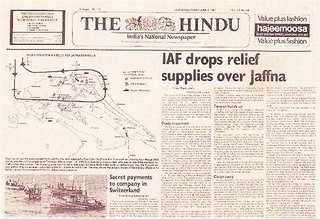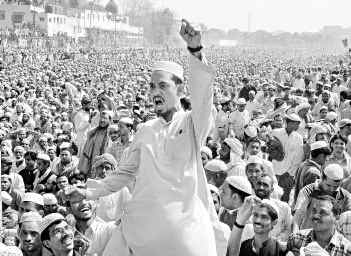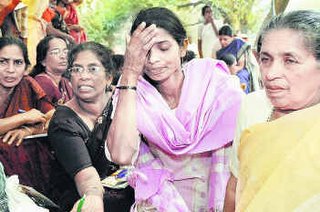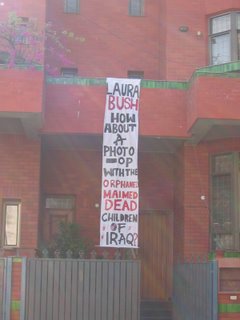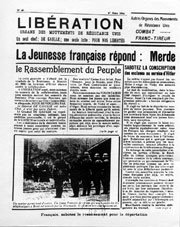Dear friends,
An interesting year-ender. As a journalist, I had the opportunity to read, edit and transmit year enders. But this one from one of my friends Lemyao was entirely different.
So this is my first post this year... Happy New Year
Shemin Joy
S.O.SLemyao Shimray
14th June 2005: The racial and communal discrimination towards people from different North East nationalities saw its heights when the fraternal organisations of the Hindu nationalist Rashtriya Swayamsevak Sang (RSS) called for uprising against "the vulgarity" as they said, "spread by Christian girls from North East in Delhi". The pamphlets were put up all across the campuses in Delhi. The translation read, "Christian girls belonging to the terrorist organisations of North East region roam around naked, and drunk late at night on the streets of Delhi. This is basically done to trap the men and then falsely accuse the men of rape in order to malign the image of Delhi and Delhi University…That, some Christian girls from Nagaland falsely accused some Bihari men of raping them in train."
One of the most serious social threats in Delhi is the increasing rape and molestation of women. The women from North East are targeted the most. When any case of woman from the North East is either raped, molested, or abused, the prejudice of the society in Delhi is such that the dress code and culture of different North East nationalities are blamed. Targeting people from North East is seen when the Kirori Mal College administration imposed a dress code only for North East students which was also publish in Times of India about his comment on it.(June 10, 2005).
22.June.2005: A letter was submitted by authorities of Delhi University to Naga Student justifying nothing to discriminate against any Gender , caste , region , religion were said regarding about the dress code for North East girl in Delhi University. And that the matter be treated as closed.
10. July.2005: A testimony from Manhoihkim "I was returning from Dwarka after Church service. When I reach Chirag, Delhi I was eve teased by a man, when I ignored he said something in Hindi and caught my hand. Then when I tried to resist he slapped me thrice on my face. I started walking away crying but he came to me again , caught me on my breast and slapped me repeatedly saying that he resides in Chirag and it is his area. He threatened me with life and modesty if I complain.
11. July.2005: In Hindustan times it was mention that on Sunday 3.30 pm a 24 years old North East girl along with her friend, while coming back to her rented room was misbehaved and molested by a Taxi service owner….and that, it is the third incident in the couple of months involving girls from North East.
13 Oct.2005: FIR was filed by North East girl A.Gunlu who stays in North Delhi hostel complaining against a person who physically assaulted and molested her while coming back from NSUD sports week.
12. Nov.2005: Two women and a man from Nagaland were attack by two young men.
15. Nov.2005: A Manipuri girl was molested by three youths in Nehru Vihar, Delhi. When the girl raise alarm, a crowd gathered but no one made any move to chastise the three men, who in turn raised voices and started threatening the victim before running away. The police were reluctant to file an FIR as the three youths were from the same locality which led to a mass protest by Manipur Student Association Delhi (MSAD).
17.Nov.2005: North East girl from Delhi University student was misbehaved by 20 years old youth when the girl had gone to the market accompanied by her brother and a friend which led to the protest from North East student.
18. Nov.2005: HINDU "Two young men have been arrested on charges of harassing a North East girl.
21. Nov.2005: TIMES OF INDIA "Two youth arrested on Sunday for allegedly assaulting North East woman on Saturday night. They beat up her cousin brother after he tried to intervene.
14. Dec.2005: A Manipuri woman in Gurgoan was almost dragged into truck on 12.Dec at 6.30pm. She manages to escape at the last minute. According to the police the woman was walking through main gate when a truck started following her. The driver offered a lift which she refused, but the truck continued to follow her as she walks into the colony of Sun City. After a while the truck driver and his cleaner started passing lewd remarks, forcing the woman to run into a narrow lane. Her pursuers got off from the vehicle and began chasing her and tried to drag her into the vehicle. The Manipuri women, however, manage to break free and run towards a nearby house. She rang the bell and sought refuge there. Said the investigating officer "neither the Sun City management nor the resident informed police and thus the investigation got delayed and the truck driver managed to flee and the guard could not chase them."
Now the situation has worsened and the women in Delhi are not safe at all even in broad daylight. The police are reluctant to work on it if it is to do with North East which gives more courage for the culprit, the public watch as a mere spectator if we defend ourselves and judge us as outcaste and uncivilised if we create scene while defending ourselves.
Such is the case when I broke a finger of an Indian man in a crowded bus when he grope and try to squeeze my buttock. When I threatened to gouge his eyes out next time I was left with a comfortable space in that crowded bus by the public inside with a clear message that there is one insane, uncivilised, wild North East girl among the well mannered ladies and gentlemen. No one judge him but they make a point to recognise me as an outcaste.
Most of the women who are the victims are either those working late as in call centre or showroom or student staying in rent. The mindset of the young generation in Delhi about North East is that we are too liberal in every way and that we should be more conservatives are lame excuses and have nothing to do with culture and upbringing. There are many Indians who wear only Salwar Kameez and still work as a call girl, many who don’t touch a drink but still give free sex! This outrage alarming gesture is a plain Gender, caste; region, religion and sexual discrimination which even the administrator are in hand encouraging the Indian youth.
It is an appeal to organisation from back home to at least take an immediate initiative to black out such mentality and for the safe guard of North East women in Delhi. The above mention incident are few that were spotted within half a year and many were left unreported and unspotted, which cannot und ermined as not serious. Support and initiative from back home is only the hope the NorthEast women can rely on this New Year for their safety.
KUKNALIM!!!!!
